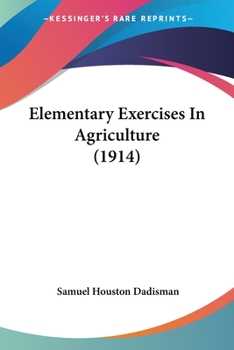Elementary Exercises In Agriculture (1914)
Select Format
Select Condition 
Book Overview
""Elementary Exercises in Agriculture"" is a comprehensive guide to the fundamentals of agriculture, written by Samuel Houston Dadisman and published in 1914. The book is designed to provide students with a practical understanding of the agricultural industry and its various components. It covers topics such as soil composition, plant growth and development, livestock management, and agricultural economics. The book is organized into chapters that are each devoted to a specific topic, with each chapter including a set of exercises designed to reinforce the concepts discussed. The exercises range from simple questions to more complex problems, and are designed to challenge students to think critically about the material. ""Elementary Exercises in Agriculture"" is a valuable resource for anyone interested in learning about the basics of agriculture, and is particularly useful for students in agricultural programs or those preparing for a career in the industry.This scarce antiquarian book is a facsimile reprint of the old original and may contain some imperfections such as library marks and notations. Because we believe this work is culturally important, we have made it available as part of our commitment for protecting, preserving, and promoting the world's literature in affordable, high quality, modern editions, that are true to their original work.
Format:Paperback
Language:English
ISBN:0822334712
ISBN13:9780822334712
Release Date:September 2005
Publisher:Duke University Press
Length:240 Pages
Weight:0.79 lbs.
Dimensions:0.6" x 6.2" x 9.3"
More by Gayle C. Avery
Customer Reviews
0 customer rating | 0 review
There are currently no reviews. Be the first to review this work.

























